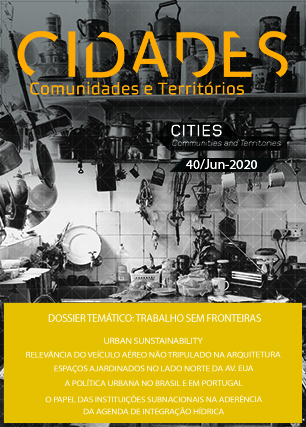Formalisation as a judicial claim
The case of paid domestic workers in Argentina
Keywords:
Paid domestic work, formalisation, informality, labour regulations, labour justiceAbstract
In Argentina, the majority of domestic workers are not registered. The combination of a lack of regulatory frameworks, limited inspection capabilities on the part of the state, and the culturally entrenched notion of domestic work as “servitude” and “help” has made informality the rule for paid domestic workers. Thus, formalisation is considered fundamental for the recognition of the social and labour rights, at both the policy and individual levels. The latter is evident in the process of labour disputes resolution established by the Domestic Work Tribunal in Buenos Aires. Thus, this article seeks to understand how the demand for formalisation appears at the centre of disputes over the recognition of rights at the Domestic Work Tribunal, becoming a judicial claim. How does the meaning of formalisation shift when the concept is used in the context of an individual labour dispute at the tribunal?
The paper, which is divided into two sections, draws on a study of the legal framework for paid domestic work, a quantitative and qualitative analysis of 156 judicial files and 1,000 rulings, and four months of ethnographic fieldwork. The first section analyses the way in which the process of formalisation is discussed, conceived, and implemented at the international and national level, and the way it is appropriated by employers and domestic workers. The second focuses on the dispute resolution process in which the meaning of formalisation changes according to the diverse actors involved.
References
Blackett, A. (2019), Everyday transgressions: domestic workers’ transnational challenge to international labor law, NY: Cornell University Press.
Bourdieu, P. (1986), “La force du droit. Éléments pour une sociologie du champ juridique”, Actes de la Recherche en Sciences Sociales, 64, pp. 3-19.
Chen, M. (2012), “The Informal Economy: Definitions, Theories and Policies”, WIEGO (Women of Informal Employment: Globalizing and Organizing), working paper 1.
Davidov, G. (2005), ‘Enforcement problems in ‘informal’ labor markets: a view from Israel’, Comparative Labor Law and Policy Journal, 27 (3), pp. 26.
Débora, G. and A. Tizziani (2018), ¿Cada una en su lugar? Trabajo, género y clase en el servicio doméstico, Buenos Aires: Editorial Biblos.
Groisman, F. and M. E. Sconfienza (2013), “El servicio doméstico en Argentina. Particularidades y desafíos de un sector relegado (2004-2012)”, Carta Económica Regional, 24, pp. 151-172.
Hussmanns, R. (2004a), ‘Statistical definition of informal employment: Guidelines endorsed by the Seventeenth International Conference of Labour Statisticians (2003)’, 7th Meeting of the Expert Group on Informal Sector Statistics (Delhi Group).
Hussmanns, R. (2004b), ‘Measuring the Informal economy: From employment in the informal sector to informal employment’, ILO, Policy Integration Department, working paper 53.
International Labour Office (ILO) (2013), Domestic workers across the world: Global and regional statistics and the extent of legal protection, Geneva: ILO.
International Labour Office (ILO) (2016), Formalizing Domestic Work, Geneva: ILO.
International Labour Organization (ILO) (1991), “The Dilemma of the Informal Sector”, Report of the Director-General, International Labour Conference, 78th Session, Geneva.
International Labour Organization (ILO) (2002), “The Resolution concerning decent work and informal economy”, International Labour Conference, 90th Session, Geneva.
International Labour Organization (ILO) (2003), “Guidelines concerning a statistical definition of informal employment”, endorsed by the Seventeenth International Conference of Labour Statisticians (November-December 2003).
Kuznesof, E. (1993), “Historia del servicio doméstico en la América hispana (1492-1980)”, in E. Chaney and M. Garcia Castro, Muchacha, cachifa, criada, empleada, empregadinha, sirvienta y…nada más: Trabajadoras del hogar en América Latina y el Caribe, Caracas: Nueva Sociedad.
La Hovary, C (2015), ‘The Informal Economy and the ILO: A Legal Perspective’, International Journal of Comparative Labour Law and Industrial Relations, 30, pp. 391, 441.
MTEySS (Ministry of Labour, Employment and Social Security) (2006), Situación laboral del servicio doméstico en Argentina, Buenos Aires: MTEySS, Secretaría de Programación Técnica y Estudios Laborales.
Neffa, J. (2008) (ed), La informalidad, la precariedad laboral y el empleo no registrado en la provincia de Buenos Aires, Buenos Aires: CEIL-PIETTE/CONICET-OIT.
Pereyra, F. (2012), “La regulación laboral de las trabajadoras domésticas en Argentina. Situación actual y perspectivas”, in V. Esquivel, E. Faur and E. Jelin, Las lógicas del cuidado infantil. Entre las familias, el Estado y el Mercado, Buenos Aires, IDES/UNICEF/UNFPA, pp. 165-199.
Pereyra, F. (2017), “Trabajadoras domésticas y protección social en Argentina: avances y desafíos pendientes”, Serie Documento de Trabajo no.15. Buenos Aires: OIT.
Pérez, I.; R. Cutuli and D. Garazi (2018), Senderos que se bifurcan. Servicio doméstico y derechos laborales en la Argentina del siglo XX, Mar del Plata: EUDEM.
Rodgers, J. (2009), “Cambios en el servicio doméstico en América Latina”, in M.E. Valenzuela, María Elena and C. Mora (eds.), Trabajo doméstico: un largo camino hacia el trabajo decente, Santiago de Chile: ILO.
Salim, J and D’angela, W. (2006), “Evolución de los Regímenes Simplificados para Pequeños Contribuyentes en la República Argentina”, Buenos Aires: AFIP.
Trebilcock, A. (2006), “Using Development Approaches to Address the Challenge of the Informal Economy for Labour Law”, in G Davidov and B Langille (eds), Boundaries and Frontiers of Labour Law, Portland: International Institute for Labour Studies-Hart Publishing.
Vega Ruiz, M.L. (2011) “L’administration et l’inspection du travail dans le domaine du travail domestique: les expériences de l’Amérique latine”, Canadian Journal of Women and the Law, 23 (1), pp. 341-358.
Downloads
Published
Issue
Section
License
CIDADES, Comunidades e Territórios by DINÂMIA'CET-Iscte is licensed under a CC-BY licence.






